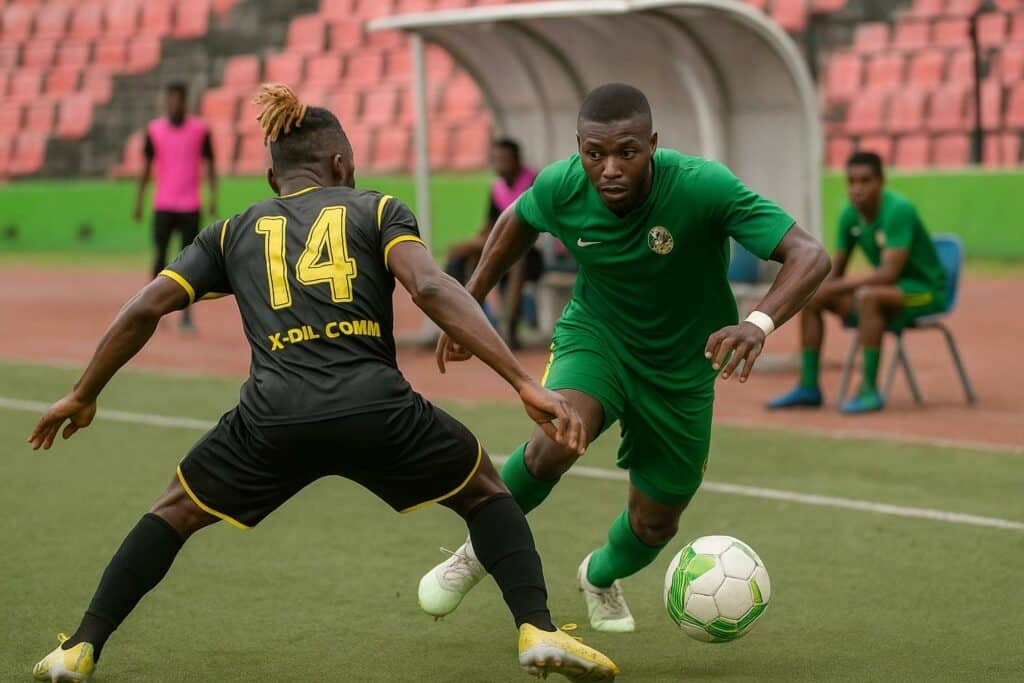High-stakes countdown to 27 September
The calendar approved by the Congolese Football Federation (Fécofoot) envisaged a ceremonial kick-off for the 2025-2026 season on 13 September. Two weeks later, the whistle has yet to sound. The federation postponed the opening fixture to 27 September after the Ministry of Sports withheld access to the three national stadiums, citing the need for additional safety audits and technical conformity with recent Confederation of African Football (CAF) and FIFA guidelines. With barely a fortnight remaining, officials are racing against the clock to avoid a second consecutive blank season, a scenario lamented by club executives as well as the 600 professional players whose livelihoods depend on match bonuses.
Government emphasis on safety compliance
In several communiqués issued since mid-August, the ministry underlined that the Alphonse-Massamba-Débat, Municipal and Paul-Sayal-Moukila stadiums require reinforced crowd-control barriers, upgraded medical rooms and revised emergency-evacuation signage. According to one senior official, “public safety cannot be negotiated; we owe the nation’s supporters venues that meet continental standards”. The argument resonates in a region still haunted by the tragic 2019 Freetown stadium crush. The authorities also note that recent CAF inspection reports highlighted the early signs of structural fatigue in the concrete seating bays of Brazzaville’s emblematic arena.
Fécofoot’s conciliatory stance and alternative plan
Fécofoot President Jean-Guy Blaise Mayolas has opted for dialogue, refraining from public recrimination and pledging to “support the government’s quest for excellence”. Nonetheless, he points to two ministerial decrees, signed in 2014 and 2016, that granted the federation a twenty-year usufruct over the three main venues after FIFA financed the installation of synthetic turf. In the absence of a rapid green light, the federation proposes to relocate the first matchdays to the National Technical Centre in Ignié, 45 kilometres north of Brazzaville. Local contractors have already been contacted to expand the modest 3 000-seat stand and enhance lighting. “If we must begin there to keep our athletes active, we shall,” Mayolas told a radio audience (Radio Congo interview, 8 September).
Institutional tensions linger after FIFA suspension lift
Observers in the sports press interpret the stalemate through the prism of the 2023 FIFA suspension that temporarily sidelined Fécofoot over third-party interference. The sanction was lifted in January 2024 once the federation amended its statutes; however, journalists from Les Dépêches de Brazzaville and independent analysts suggest that the episode left diplomatic bruises between the ministry and the federation’s executive committee. Allegations of financial opacity have surfaced periodically, yet prosecutors have not opened formal proceedings. Both parties now profess a desire to turn the page, but each letter left unanswered deepens the mistrust, leaving calendar planning hostage to institutional protocol.
Economic ripple effects of a blank season
Beyond the symbolic blow, an unplayed season would impose tangible economic costs. Ticketing in Brazzaville and Pointe-Noire generated an estimated 900 million CFA francs in 2022, feeding ancillary employment for vendors, transport cooperatives and hospitality outlets bordering the stadiums. According to the Union des clubs de Ligue 1, sponsors have already suspended 40 % of their disbursements pending clarity on fixture dates. Crucially, the player-export pipeline—Congo’s primary generator of transfer revenue—relies on domestic exposure for scouts. “No games, no footage, no contracts,” warns agent Léonce Mbemba, who notes that five prospective moves to Ligue 2 France collapsed last winter owing to a lack of recent match data.
Players’ perspective: careers on hold
Midfielder Bertin Ndombé of Diables Noirs speaks for many peers when he describes an eerie off-season stretching into its fifteenth month: “We train, we scrimmage, but the competitive edge fades.” Physical conditioning coaches confirm a rising risk of over-use injuries as athletes oscillate between peaks of hope and troughs of hiatus. The psychological toll is equally acute, says sports psychologist Dr. Clarisse Tchicaya, who reports a surge in consultations for anxiety among under-23 prospects eyeing continental youth tournaments.
Regional context and diplomatic nuance
Congo-Brazzaville is not isolated in navigating infrastructural reforms. Neighbouring Gabon closed its Libreville stadium for ten months in 2022 to retrofit seating and electronic turnstiles, a decision applauded by CAF inspectors. By foregrounding safety, Brazzaville aligns itself with a continental trend toward stricter compliance, an objective consonant with President Denis Sassou Nguesso’s broader agenda of modernising public facilities. Analysts interviewed by the Central African Sports Observatory argue that a calibrated timetable—combining phased renovations with staggered league fixtures—could reconcile both imperatives without eroding the country’s football culture.
À retenir
The 27 September deadline remains feasible if final safety certificates are issued this week, a scenario that would allow the first four matchdays to be contested at Ignié while refurbishment commences in the capital and the coast. Stakeholders agree that a negotiated memorandum of understanding, rather than litigation, offers the swiftest path back to play.
Le point juridique/éco
Jurists recall that the 2014 and 2016 agreements constitute administrative contracts; any unilateral revocation by the State would require a justified public-interest motive and compensation for losses incurred by Fécofoot. From an economic standpoint, a delayed start of one month would reduce broadcasting revenue by roughly 80 million CFA francs, a gap that insurers could partly offset if the delay is formally recognised as force majeure linked to safety compliance.
Outlook: a narrow window for compromise
Meetings scheduled this Monday between Sports Minister Hugues Ngouelondelé and Fécofoot’s board will be pivotal. Should consensus emerge on a phased reopening, the league could salvage a condensed but credible season, preserving player welfare and commercial contracts. Failure would push Congo toward a second year without top-flight football, a prospect few stakeholders are willing to contemplate. For now, the ball rests in the delicate interplay of technical reports, legal precedents and the shared passion of a nation that longs to hear the referee’s whistle once more.

